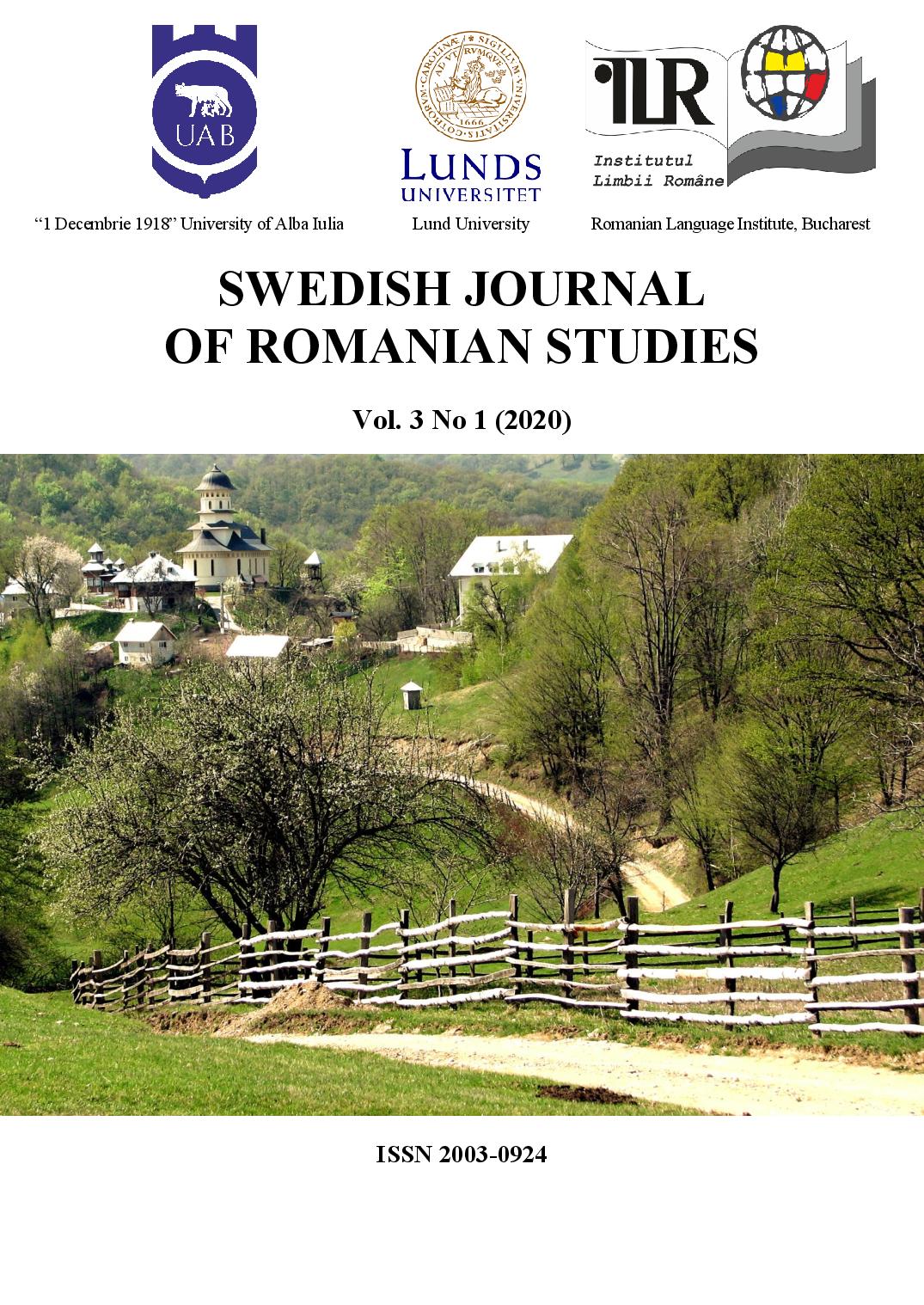A community of spoken words. Forms and practices of the conversation at Viața românească cenacle
DOI:
https://doi.org/10.35824/sjrs.v3i1.21417Keywords:
conversation; cenacle; phenomena of loss; laughter; Viața româneascăAbstract
The present article analyses the conversation of the cenacle Viața românească by exploring three directions of research. In the first place, the study concentrates on the conversation as a phenomenon of loss, focussing on the voice of the writers and oral speech as signs of extreme fragility. On the one hand, the reflection on the absence of the spoken word articulates an imaginary of evanescence that functions as a collective representation of the community. On the other hand, it reconsiders the relation between the oral and the written word by favouring the conversation against the literary work. In the second place, the article investigates the forms of the conversation specific to the cenacle as they appear in the memoirs of some members. Representing the cenacle as a democratic society where each member has equal rights, the memoirs of the cenacle depict, at the same time, some regulations that limit the speech such as the anti-rhetoric, the delicacy, and the admiration. Finally, the last issue to be approached is the content of the conversation. On the one hand, the cenacle represents itself as an elevated group that discusses the issues of literature, investing in the “profitable” conversation (Glinoer, Laisney) at the expense of the agreeable interaction. On the other hand, the cenacle values the forms of entertainment as a way of detachment from writing, the study focussing, in the last part, on the functions of laughter inside the literary community.
References
Assmann, J. (2013). Memoria culturală. Scriere, amintire și identitate în marile culture antice/ Cultural memory. Writing, remembrance, and identity in the early civilizations. Iași: Editura Universității „Alexandru Ioan Cuza”.
Barthes, R. (2002). Comment Vivre Ensemble. Simulations romanesques de quelques espaces quotidiens/ How to Live Together: Novelistic Simulations of Some Everyday Spaces. Seuil: IMEC.
Blaise, M., Triaire, S., Vaillant, A., eds. (2009). L’histoire littéraire des écrivains. Paroles vives./ The Literary History of the Writers. Lively Words. Montpellier: Presses universitaires de la Méditerranée. Disponibil pe : https://books.openedition.org/pulm/829?format=toc. https://doi.org/10.4000/books.pulm.829.
Botez, D. (1961). Mărturisiri/ Testimony. În Viața românească. November, nr.11, pp. 64–66.
Botez, D. (1966). Mihai Carp. În Viața românească, March, nr.3, pp. 163–166.
Botez, D. (1970). Memorii/ Memoirs. București: Minerva.
Carp, M. (1936). Stilul lui Ibrăileanu/ Ibrăileanuʼs Style. În Însemnări ieșene. April–May, nr. 9, pp. 403-407.
Corbin, A. (1995). LʼAvénement des loisirs, 1850 – 1960/ The Birth of the free time, 1850 – 1960. Paris: Aubier.
Diaz, J.-L. (2003): Quelle histoire littéraire?/ What Literary History?. Revue dʼhistoire littéraire de la France, 3 (vol. 103), from https://www.cairn.info/revue-d-histoire-litteraire-de-la-france-2003-3-page-515.htm. https://doi.org/10.3917/rhlf.033.0515
Fumaroli, M. (1994): Trois institutions littéraires/ Three Literary Institutions. Paris: Gallimard.
Glinoer, A., Laisney, V. (2013). Lʼâge de cénacle. Confraternités littéraires et artistiques au XIXe siècle/ The Time of the Cenacle. Literary and Artistic Confraternities in the 19th Century. Paris: Fayard.
Ibrăileanu, G. (1978). Opere/ Works, vol. 6 (Al. Piru, R. Rotaru, Eds.). București: Minerva.
Ibrăileanu, G. (2010). Scrieri alese/ Selected Writtings (A. Patraș, R. Patraș, Eds.). Iași: Editura Universității „Alexandru Ioan Cuza”.
Laisney, V. (2003). Choses dites: petite histoire littéraire de la parole au XIXe siècle/ Spoken Words: Small Literary History on the Speech in 19th Century. In Revue dʼHistoire Littéraire de la France, 3 (vol. 103), pp. 643-653. From https://www.cairn.info/revue-d-histoire-litteraire-de-la-france-2003-3-page-643.htm#. https://doi.org/10.3917/rhlf.033.0643
Leonte, L. (1998). Continuitate și înnoire („Viața românească” în perioada interbelică/ Continuity and innovation (“Viața româneacă” in the interwar period). In Scriitori, cărți reviste/ Writers, books, magazines. Iași: Cronica.
Mironescu, D. (2016). Un secol al memoriei. Literatură și conștiință comunitară în epoca romantică/ A Century of Memory. Literature and Collective Conscience in Romanticism. Iași: Editura Unversității „Alexandru Ioan Cuza”.
Ornea, Z. (1972). Poporanismul/ The Poporanism. București: Minerva.
Patraș, A. (2007). Ibrăileanu. Către o teorie a personalității/ Ibrăileanu. A Theory on the Personality. București: Cartea Românească.
Sadoveanu, I. (1930). Studii literare/ Literary Studies. În Adevărul literar și artistic. April 6, nr. 487, p. 4.
Sevastos, M. (2015). Amintiri de la „Viața românească”/Memories from “Viața românească” circle. Iași: Polirom.
Sibony, D. (2010): Les Sens du rire et de l’humour/ The Significance of Laughter and Humour. Odile Jacob.
Teodoreanu, I. (1947). Masa umbrelor/ The Table of Shadows. București: Forum.
Tudurachi, L (2019): Grup sburător. Scrisul și trăitul împreună în cenaclul lui E. Lovinescu/ Sburătorul Group. The Writing and the Living in E. Lovinescuʼs Cenacle. Timișoara: Editura Universității de Vest.
Vianu, T. (1927). Scriitori români și străini/ Romanian and Foreigner Writers. În Gândirea. May 5, nr. 5, pp. 190–191.
Downloads
Published
How to Cite
Issue
Section
License
Authors who publish with this journal agree to the following terms:
a. Authors retain copyright and grant the journal right of first publication with the work simultaneously licensed under a Creative Commons Attribution-NonCommercial 4.0 International License that allows others to share the work with an acknowledgement of the work's authorship and initial publication in this journal.
b. Authors are able to enter into separate, additional contractual arrangements for the non-exclusive distribution of the journal's published version of the work (e.g., post it to an institutional repository or publish it in a book), with an acknowledgement of its initial publication in this journal.
c. Authors are permitted and encouraged to post their work online (e.g., in institutional repositories or on their website) prior to and during the submission process, as it can lead to productive exchanges, as well as earlier and greater citation of published work (See The Effect of Open Access).

